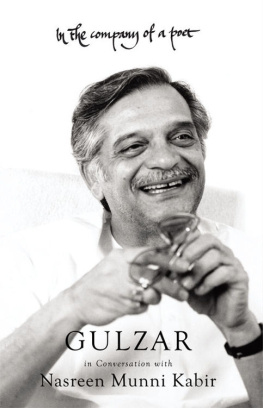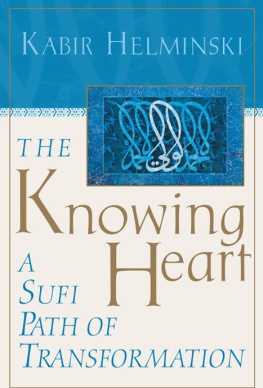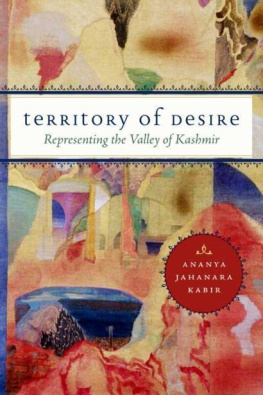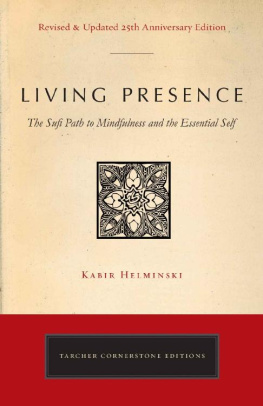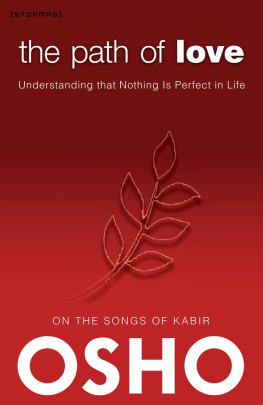Kabir - Kabir: the weavers songs
Here you can read online Kabir - Kabir: the weavers songs full text of the book (entire story) in english for free. Download pdf and epub, get meaning, cover and reviews about this ebook. City: India, year: 2003;2012, publisher: Penguin Books Ltd;Penguin Global, genre: Religion. Description of the work, (preface) as well as reviews are available. Best literature library LitArk.com created for fans of good reading and offers a wide selection of genres:
Romance novel
Science fiction
Adventure
Detective
Science
History
Home and family
Prose
Art
Politics
Computer
Non-fiction
Religion
Business
Children
Humor
Choose a favorite category and find really read worthwhile books. Enjoy immersion in the world of imagination, feel the emotions of the characters or learn something new for yourself, make an fascinating discovery.

- Book:Kabir: the weavers songs
- Author:
- Publisher:Penguin Books Ltd;Penguin Global
- Genre:
- Year:2003;2012
- City:India
- Rating:3 / 5
- Favourites:Add to favourites
- Your mark:
- 60
- 1
- 2
- 3
- 4
- 5
Kabir: the weavers songs: summary, description and annotation
We offer to read an annotation, description, summary or preface (depends on what the author of the book "Kabir: the weavers songs" wrote himself). If you haven't found the necessary information about the book — write in the comments, we will try to find it.
Kabir: author's other books
Who wrote Kabir: the weavers songs? Find out the surname, the name of the author of the book and a list of all author's works by series.
Kabir: the weavers songs — read online for free the complete book (whole text) full work
Below is the text of the book, divided by pages. System saving the place of the last page read, allows you to conveniently read the book "Kabir: the weavers songs" online for free, without having to search again every time where you left off. Put a bookmark, and you can go to the page where you finished reading at any time.
Font size:
Interval:
Bookmark:

PENGUIN CLASSICS
Vinay Dharwadker was born in Pune in 1954, and was educated at St. Stephens College, Delhi University, and the University of Chicago. He is the author of a book of poems, Sunday at the Lodi Gardens (1994), and an editor of The Oxford Anthology of Modern Indian Poetry (1994), a co-editor of The Collected Poems of A. K. Ramanujan (1995), and the general editor of The Collected Essays of A. K. Ramanujan (1999). His other edited books include Cosmopolitan Geographies: New Locations in Literature and Culture (2001). He has published translations of modern Hindi, Marathi, Urdu and Punjabi poetry, as well as essays on literary theory, translation studies and Indian English literature. He teaches Indian languages and literatures at the University of Wisconsin-Madison, where he also serves as the Director of the Centre for South Asia.
The Weavers Songs
Translated and
with an Introduction and Notes by
VINAY DHARWADKER

PENGUIN BOOKS
UK | Canada | Ireland | Australia
New Zealand | India | South Africa
Penguin Books is part of the Penguin Random House group of companies whose addresses can be found at global.penguinrandomhouse.com.

This collection published 2003
Copyright Vinay Dharwadker 2003
The moral right of the author has been asserted
ISBN: 978-0-143-02968-7
This digital edition published in 2016.
e-ISBN: 978-8-184-75333-2
This book is sold subject to the condition that it shall not, by way of trade or otherwise, be lent, resold, hired out, or otherwise circulated without the publishers prior consent in any form of binding or cover other than that in which it is published and without a similar condition including this condition being imposed on the subsequent purchaser.
Kabirs poems have circulated in several languages across north India for the past five or six centuries, and he is probably the most frequently quoted poet in the modern Hindi world. He nevertheless remains an enigmaa shadowy presence behind the poetry, a voice, a simulacrum, a form of imagination constantly eluding our grasp. After nearly 200 years of scholarly research on his life and work, he appears to be a singer who has disappeared into his songs: he has ceased to be a person, and has become a whole climate of opinion instead. In fact, in W. H. Audens words memorializing W. B. Yeats in 1939, he is the type of poet whose death was kept from his poems, and who literally became his admirers (Auden 1991, 275, 247).
These remote echoes from the twentieth century are significant because they are symptoms of the ways in which Kabirs poetry has stayed alive for more than half a millennium. Yeats himself first encountered a sample of it in Rabindranath Tagores translations, which were published in Songs of Kabir in 1915 with an Introduction by Evelyn Underhill. The brief fable of the has in the twelfth song in that book must have resonated strongly with the Irish poet, for its symbolism of the soul as a swan or a bird on a journey beyond the human and natural realms seems to have influenced his conception of The Wild Swans at Coole shortly afterwards. Tagores translation was prosaic and speculative, but it conveyed enough of the ideawhich the Kabir tradition had borrowed from older Indian and Persian traditionsto have an impact on Yeats.
Tell me, O Swan, your ancient tale.
From what land do you come, O Swan? to what shore will
you fly?
Where would you take your rest, O Swan, and what do you
seek?
Even this morning, O Swan, awake, arise, follow me!
There is a land where no doubt nor sorrow have rule: where ,
the terror of Death is no more.
There the woods of spring are a-bloom, and the fragrant
scent He is I is borne on the wind:
There the bee of the heart is deeply immersed, and desires no
other joy. (Tagore 1915, 5556)
A more attentive rendering of the kind I offer in this volume reveals that the poem is lighter, more lyrical and suggestive, than the older version indicates:
Dear Swan,
talk of ancient things.
What country have you come from,
what shore will you alight on?
Where have you stopped and rested,
what goal have you set your heart on?
Its now the morning of consciousness,
lets leave together.
We wont be filled with grief and doubt in that place,
the fear of death wont strike us there.
Here the forests of desire are in bloom,
their fragrance assails us straight ahead.
A place that ensnares the beetles of the heart
can offer no hope of happiness.
Despite the opacity of Tagores English, Kabirs song conveyed its mood to Yeats quite precisely, and induced him to create an analogous atmosphere when he wrote about the mysterious, beautiful swans on the lake at Coole Park, Lady Gregorys estate in Galway, in 1916.
The resonances of the poetry associated with Kabir in modern times are not only poetic but also philosophical and conceptual. In the 1960s, Jacques Derrida, Roland Barthes and Julia Kristeva, among others in France, discovered that the words texte and text contain the metaphor of textile, allowing us to view a text as a woven fabric, and hence as an instance of textuality; a group of texts as an interwoven continuum, and hence as an embodiment of intertextuality; and even the world as a continuous text, and hence as a vast fabrication or ideological construct (Makaryk 1993, 56872, 63942). But some three and a half centuries earlier, a canonical version of Kabirs poems had already conceived of God as a Master Weaver, and the universe as an interlacing of warp and weft on His divine loom. More presciently, the poems had imagined the human body itself as Gods handiwork in the form of a fine-spun cotton sheet, in a world where reality is nothing but illusion.
It was an allegorical image of astonishing acuity. Medical science, for example, now tells us that when the fertilized human egg begins to divide and replicate in the womb, it first generates a flat sheet of cells, one cell thick, that rolls itself into a cylinder to form the tube of the spine, around which the embryo then builds itself with layers of tissue. For the Kabir text fixed in the early seventeenth century, the human body is always already a kosha, an envelope, woven on the loom of procreation like a sheet of diaphanous muslin, to be wrapped around mind, consciousness and self. The penetrating quality of such conceptions has repeatedly renewed the poetic power of Kabirs verse, raising it to the level of a perpetually modern classic.
In the course of the twentieth century, Kabir has come to be construed as an individual author in the modern sense of the term, and to occupy a position of primacy in the history of Indian literatures and religions. He is widely regarded as the first major poet in the Hindi language; as the earliest author of the bhakti movement in Hindi literature; and as the di sant, the first and predominant figure, in the sant parapar of north India, a multifaceted tradition of philosophical, theological and social argument that began to dismantle the structures of classical Hinduism around the fifteenth century, and to replace them with a new architecture of ideas. Moreover, Kabir is a primary influence on the early Sikh Gurus, and hence plays an important role in the formation of Sikhism as a distinctive, antithetical religion.
Font size:
Interval:
Bookmark:
Similar books «Kabir: the weavers songs»
Look at similar books to Kabir: the weavers songs. We have selected literature similar in name and meaning in the hope of providing readers with more options to find new, interesting, not yet read works.
Discussion, reviews of the book Kabir: the weavers songs and just readers' own opinions. Leave your comments, write what you think about the work, its meaning or the main characters. Specify what exactly you liked and what you didn't like, and why you think so.

